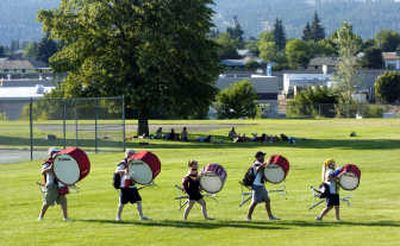Corps commitment

As the temperature climbed past 100 degrees on Thursday, 21-year-old Matt Walsh raised his silver tuba over his shoulder.
On command from instructor Eric Parker, Walsh brought the awkward 21-pound instrument upright in front of his body, again and again, a process he would repeat for the next four hours.
“It’s almost like a bench press,” said Walsh, as the sun beat down on the field at Centennial Middle School in Spokane Valley where he and about 60 other members of the Spokane Thunder Drum and Bugle Corps practiced.
Over the next two weeks, members of the elite ensemble will spend 12-hour days – even in the sweltering heat – perfecting their performance as they prepare to head out for a 25-day tour.
“I lost 25 pounds last year,” said Brandon Campbell, 17, between guzzles from a two-gallon water jug. He said he tries to drink three or four each day, sweating most of it out.
Another horn player didn’t mess with the water jug; instead he strapped on a Camelbak water system so he could drink hands-free and without waiting for a break.
“That’s cheating,” said tuba player Michael Butler, 17. Butler was without his shirt and sweating profusely. “Then again, maybe he has the right idea.”
The first few days of practice are very repetitive. Students march quickly, side-stepping in unison and practicing short bursts of music. They run back to positions to start all over again. There are very few smiles, the students focused on counting beats and steps.
“I love music and I love marching, and this brings it all together,” Campbell said. “It’s a good way to spend the summer.”
Spokane Thunder is a nonprofit musical group organized under Drum Corps International, which bills itself as “Marching Music’s Major League.”
While what they do is performance on the field with music, flags, rifles and marching, it’s not marching band, members say.
“It’s way more intense,” said Erin Headlee, 17, who performs with the color guard. “It’s not even the same thing.”
Thousands of high school and college students audition each summer for spots on various drum and bugle corps of different sizes around the country. Spokane Thunder is one of only three in the Northwest; the others are in Seattle and Portland. Spokane members range in age from 14 to 21 and come from all over the United States and Canada. Most of the members are local and return year after year.
Members pay an annual fee of $1,450, which covers training, travel, food, instruments, uniforms and everything else needed for the tour. If a student can’t afford the fee, the Greater Spokane Drum Corps Association finds a way to pay it for them. The nonprofit association raises additional funds to help offset costs of the tour.
When the ensemble hits the road July 26, they will have a tractor trailer for their instruments, two tour buses, and a storage truck for food and accessories. Parent volunteers prepare all the meals on the road and during practice.
“This particular creature is not for everybody,” said Ron Crenshaw, Spokane Thunder executive director. “The work ethic is pretty demanding.”
The group comes together for only two weeks to practice for the tour, ending with the world championships in Pasadena, Calif.
Each morning members gather for stretching and conditioning exercises, including a light jog, to prepare for the day ahead. Then they split up by section: Marimbas, other percussion, color guard, and horns work independently, and then after dinner come together to work into the night.
The performance is eight to 10 minutes long and usually has a theme. This year the Spokane Thunder’s performance is called “The 24-Hour Suite.”
“I think some people put music and athletics on two different planes,” Crenshaw said. “But this is a very physically demanding sport.”
Sometimes the joke in camp is that “if it were any easier, it’d be football.”
Instructor Nick Molenda, a 22-year-old recent graduate of the University of Washington and a member of that school’s drum line, came from Seattle to work with the Spokane drum corps. Molenda walked through the ranks of the percussion section this week, sounding more like a drill sergeant than a teacher.
“I don’t care if you are tired,” he said, as the sun glared down on bare chests shouldering drum sets that can weigh in excess of 50 pounds.
When it was time for lunch, Molenda warned his students not to get comfortable because there was more work to be done.
“You have to be this way with as little time as you have to make things perfect,” Molenda said. “It is very, very physically demanding.”
To be sure, ESPN2 recently recognized marching as a sport and agreed to broadcast the drum corps championships.
“We put the cool back in band,” Crenshaw said.
“Who took it out?” horn player Mike Gordon, 17, chimed in.
“Everybody is in this because they want to be,” said Natalya Lainhart, 19, the drum major who conducts and keeps order on the field. “Everybody understands the feeling you get when you walk off the field after a perfect show. All the hard work pays off.”